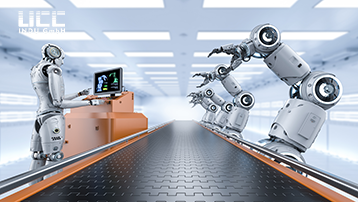 Vietnam
Vietnam
With the rapid development of the global economy and the continuous progress of science and technology, the manufacturing industry is ushering in a profound change. The emergence of next-generation industrial intelligent terminals is not only the result of technological progress, but also a comprehensive reinvention of the traditional manufacturing model. These terminals will provide new perspectives and outlooks for future smart factories through the multi-dimensional development of intelligence, digitalisation, personalisation and greening.

Intelligent: driving a leap in productivity
The smart factory of the future will rely on advanced smart technologies, such as Artificial Intelligence (AI), Internet of Things (IoT) and big data analytics, to realise the full intelligence of the production process. Through real-time data collection and analysis, factories can achieve self-awareness, self-learning, self-decision-making and self-execution. This intelligence not only improves production efficiency, but also reduces human intervention and promotes on-demand production and lean management. For example, intelligent equipment can predict equipment failures through machine learning algorithms, leading to preventive maintenance and reduced downtime and maintenance costs.
Digitalisation: realising interconnectivity across the whole industry chain
Digitalisation is one of the key features of future smart factories. By building digital workshops and cloud platforms, enterprises can realise the digital management of the whole process from product design to production, sales and service. This model enables enterprises to respond quickly to market demand and optimise resource allocation. For example, digital twin technology can simulate the production process in a virtual environment, helping enterprises identify potential problems and optimise them in advance. In addition, the application of 5G technology will further increase data transmission rates, making real-time monitoring and remote operation possible.
Personalisation: meeting diverse market demands
As consumer demand for personalised products increases, future smart factories will adopt highly reconfigurable and flexible manufacturing systems to support mass personalised production. Through Industrial Internet technologies, consumers can communicate directly with factories to make personalised demands, enabling rapid delivery. This shift not only improves customer satisfaction, but also opens up new profit growth points for companies. For example, in the apparel industry, some companies have enabled consumers to submit personalised design requests via mobile apps and connect directly to smart factories for production.
Going Green: Driving Sustainable Development
Against the backdrop of increasingly stringent global requirements for environmental protection, the smart factory of the future will also be committed to green manufacturing. By optimising resource allocation and energy management, these factories can effectively reduce carbon emissions. Using big data analytics and artificial intelligence technologies, companies can monitor energy usage in real time and adjust production plans according to actual demand to achieve energy saving and emission reduction goals. In addition, emerging technologies such as 3D printing and circular economy models will also play an important role in reducing material waste.
Future Outlook: Building a Smart Manufacturing Ecosystem
The smart factory of the future is not just an upgrade of a single piece of equipment or system, but a reconstruction of the entire manufacturing ecosystem. Enterprises will build a more open and collaborative manufacturing environment by integrating various advanced technologies, such as blockchain, artificial intelligence, and 5G communications. This ecosystem will facilitate the efficient allocation of resources from all parties to maximise innovation and value creation.
In this ecosystem, data and resources can be shared between different enterprises to jointly address market challenges. For example, through blockchain technology, it is possible to ensure that every link in the supply chain is transparent and traceable, improving overall supply chain efficiency. At the same time, 5G networks will provide support for real-time data transmission, making remote monitoring and operation possible.
In summary, next-generation industrial smart terminals will become an important force in promoting the transformation and upgrading of the manufacturing industry. Through the development of intelligence, digitalisation, personalisation and greening, these terminals not only improve production efficiency, but also provide new solutions to meet market demands. In the future, companies need to actively embrace these changes in order to be invincible in the competition. Only through continuous innovation and cooperation can they seize opportunities and achieve sustainable development in this era of rapid change.
UCC is committed to leading the intelligent transformation of the global manufacturing industry, and we continue to push the industry forward through innovative technologies. We believe that with our professional solutions, your factory will also step into a new era of intelligence. To better meet your needs, please contact our sales consultants. They will provide you with tailor-made intelligent solutions to help your factory achieve efficient transformation.
Tuyên bố: trang này cung cấp thông tin chỉ để tham khảo, chúng tôi không đảm bảo tính chính xác và toàn vẹn của thông tin, cũng không chịu trách nhiệm cho bất kỳ thiệt hại hoặc thiệt hại do sử dụng thông tin này.
Đừng bỏ lỡ thông tin cập nhật và khuyến mãi về sản phẩm của chúng tôi. Nhập địa chỉ email của bạn, bấm vào để đăng ký, để cảm hứng và thông tin tiếp tục được gửi đến hộp thư của bạn. Chúng tôi hứa sẽ tôn trọng sự riêng tư của các bạn và không bao giờ gửi thư rác.Liên hệ với chúng tôi: bạn điền vào, đổi lại là dịch vụ sốt sắng của chúng tôi!
2025-06-16
2025-06-10
2025-05-13
2025-05-09
2025-05-07
2025-04-29
2025-04-27
2025-04-23